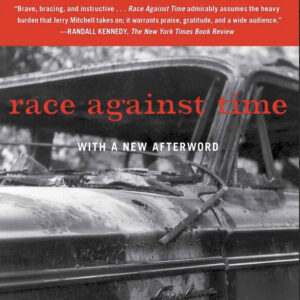calsfoundation@cals.org
Jerry Mitchell (1959–)
Jerry Mitchell was a longtime legal, courtroom, and investigative reporter. His dogged reporting led to the reopening of a number of important civil rights cases and, in doing so, helped bring to justice a number of individuals many years after they had committed their crimes.
Jerry Mitchell was born on February 23, 1959, in Springfield, Missouri, to Jerry and Jane Mitchell. During his early years, his father served as a U.S. Navy pilot, causing the family to move several times. The family lived in California, first in San Diego and then San Francisco, before settling in Texarkana, Texas.
Mitchell’s interest in journalism had begun in high school, where he served as editor of the school newspaper, and he was a columnist and news editor on his college paper at Harding University. He earned a BA in communications from Harding in 1982. In 1997, he earned an MA in journalism from Ohio State University, where he was part of the Kiplinger Reporting Program. Following an internship with the Texarkana Gazette in 1982, Mitchell became a reporter for the Arkansas Gazette, and in 1983, he took a job with the Hot Springs Sentinel-Record. There, he did his first investigative work, exposing a theme park scandal. Mitchell joined the Clarion-Ledger in Mississippi in 1986, beginning as a court reporter. After a couple of years, he began doing investigative work, prompted in part by the release of the film Mississippi Burning.
Beginning in 1989, when he began his effort to unearth the real story of the 1963 murder of Mississippi National Association for the Advancement of Colored People (NAACP) leader Medgar Evers, Mitchell pursued avenues that had previously been unexplored. Too, as someone who grew up in the South, he was able to get people to share stories and information that had previously been undisclosed. Having grown up in Texas at a time when Ku Klux Klan (KKK) activity was high, Mitchell looked back on his youth and observed, “It would have been so easy for me to be part of the culture I was living in.” But while he did not adopt that outlook on life, he did develop an understanding of the culture and the region, which allowed him to connect with people he interviewed.
While Klan member Byron De La Beckwith had been charged in 1963 with the murder of Medgar Evers, both of his 1964 trials had ended in hung juries. However, Mitchell’s investigation and interviews, including sessions with De La Beckwith himself, allowed him to piece together enough of a story to allow local prosecutors to reopen and retry the case—an effort that culminated in a guilty verdict. Similar reporting efforts contributed to the conviction of KKK Imperial Wizard Sam Bowers for ordering the fatal 1966 firebombing of Vernon Dahmer, president of the Forrest County chapter of the NAACP in Hattiesburg, Mississippi, as well as of Bobby Cherry for the 1963 bombing of a Birmingham church that killed four young girls. In addition, Mitchell’s investigation and continued articles about the murders of civil rights workers James Chaney, Andrew Goodman, and Michael Schwerner played a critical role in the ultimate conviction of Klan member Edgar Ray Killen, identified by Bowers as the main instigator of the murders, for his role in their 1964 deaths in Neshoba County, Mississippi.
Following his pioneering work with the civil rights cases, Mitchell turned his attention to the Mississippi Corrections system. In addition to uncovering a long history of corruption, he helped free Michelle Byrom, who spent fourteen years on death row for the alleged murder of her husband, after his reporting revealed major questions about her conviction.
In 2020, Mitchell published the book Race Against Time: A Reporter Reopens the Unsolved Murder Cases of the Civil Rights Era, a compelling account of his efforts to help achieve justice in some of the most infamous crimes of the civil rights era, including the murders of Chaney, Goodman, Schwerner, Evers, and Dahmer.
Mitchell’s efforts over the years have earned dozens of journalism and civic awards, including the George Polk Award for Justice Reporting, Columbia University’s John Chancellor Award, and the Sidney Hillman Prize. He was also the recipient of the Vernon Jarrett Award for Investigative Reporting, the Tom Renner Award for Crime Reporting from Investigative Reporters and Editors, and the Toni House Journalism Award from the American Judicature Society. He was also awarded a MacArthur Foundation “genius grant.” In 2006, he was presented an honorary degree by Colby College while also receiving the school’s Elijah Parish Lovejoy Journalism Award, which is awarded to a journalist who displayed the fearlessness that Colby alum Lovejoy exhibited in his efforts opposing slavery in the 1830s. As the MacArthur Foundation put it when giving him his genius grant, “In an era when long-term investigative reporting is more the exception than the rule, Mitchell’s life and work serve as an example of how a journalist willing to take risks and unsettle waters can make a difference in the pursuit of justice.”
He and his wife, Karen Mitchell, had a son and a daughter; the marriage ended in divorce.
In 2018, after working at the Clarion-Ledger for thirty-two years, Mitchell left the paper to co-found the Mississippi Center for Investigative Reporting. He serves as director of the center, which is located on the campus of Millsaps College in Jackson, Mississippi.
For additional information:
Mitchell, Jerry. Race Against Time: A Reporter Reopens the Unsolved Murder Cases of the Civil Rights Era. New York: Simon & Schuster, 2020.
Treen, Joe, “Southern Man: Klan-Busting Journalist Jerry Mitchell.” Mother Jones, January 4, 2007. https://www.motherjones.com/politics/2007/01/klan-busting-journalist-jerry-mitchell-beckwith-case/ (accessed March 27, 2021).
Wickham, Kathleen Woodruff. “Jerry Mitchell, Jr.” Mississippi Encyclopedia. https://mississippiencyclopedia.org/entries/jerry-mitchell-jr/ (accessed March 27, 2021).
William H. Pruden III
Ravenscroft School
 Divergent Prosperity and the Arc of Reform, 1968–2022
Divergent Prosperity and the Arc of Reform, 1968–2022 Mass Media
Mass Media Race Against Time
Race Against Time 




Comments
No comments on this entry yet.